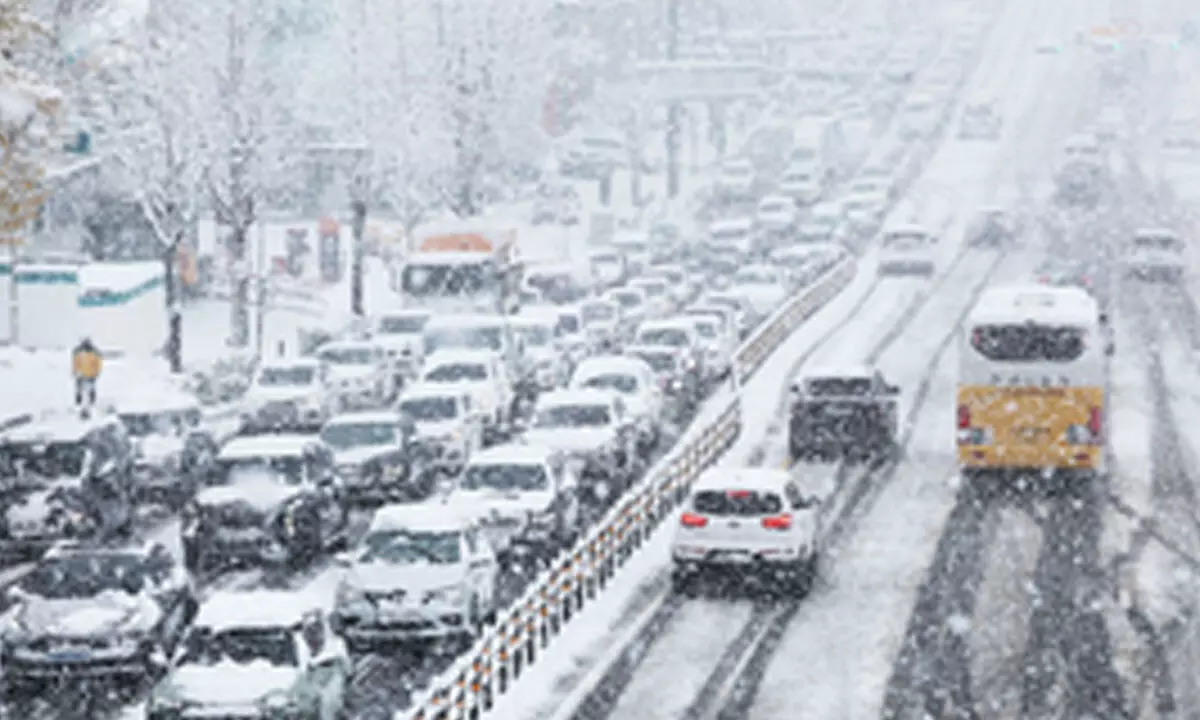Seoul hit by heaviest snowfall in over 100 years causing injuries, traffic chaos
Share :

The heaviest snowfall for November in 117 years blanketed Seoul and the surrounding regions Wednesday, causing injuries, disrupting traffic and cutting off power supplies, as authorities are on high alert for more snow later this week.
Seoul: The heaviest snowfall for November in 117 years blanketed Seoul and the surrounding regions Wednesday, causing injuries, disrupting traffic and cutting off power supplies, as authorities are on high alert for more snow later this week.
As of 3 pm, the capital city had received 18 centimeters of snow, marking the biggest snowfall in November since modern weather observations began in 1907, according to the Korea Meteorological Administration (KMA).
The new record coincided with the first snow of the season in Seoul.
The previous record was 12.4 cm set on November 28, 1972, the state weather agency said.
The city of Incheon, west of Seoul, also had record snowfall for November of 14.8 cm as of 3 pm, beating the previous record of 8 cm set in 1972, Yonhap news agency reported.
Suwon, south of Seoul, received 21 cm of snow as of 3 pm, the largest ever for any November precipitation, according to the KMA.
Snow and rain are forecast nationwide until Thursday morning, though the precipitation will continue into the afternoon in parts of Gangwon Province and North Gyeongsang Province, and until late Friday night in the Chungcheong and Jeolla provinces, and on Jeju Island.
The interior ministry had upgraded the operations of the Central Disaster and Safety Countermeasures Headquarters to Level 2 and raised the heavy snow warning from "caution" to "alert."
While standard measurements for the capital city are taken at the Seoul weather station in Jongno Ward, by district, Seongbuk Ward and Gangbuk Ward in the city's north had received 20.6 cm and 20.4 cm of snow, respectively, as of 7 am Wednesday.
A heavy snow warning was issued in the northeastern districts of Seoul, including Nowon, Seongbuk and Dobong, according to the KMA and the Seoul metropolitan government. A warning is issued when snowfall reaches 20 cm within 24 hours.
In Seoul's Songpa district, three were injured and taken to nearby hospitals after a snow fence installed near a construction site collapsed due to snow. One of them suffered a serious injury, according to police and fire authorities.
More than 170 households experienced a blackout in Seoul's Seongbuk district at 5:30 am, as trees likely fell on telegraph poles and electric wires under the weight of heavy snow, according to the Korea Electric Power Corp.
Dozens of other households in Eunpyeong-gu also experienced interruptions to power supplies, reported Yonhap news agency.
In Gangwon Province, one died and nine were injured in car crashes due to heavy snow, according to local authorities.
As of 6 pm, 150 flights had been canceled at airports nationwide due to the snow, including 71 flights at Incheon International Airport, west of Seoul, according to the Korea Airports Corp. and Incheon International Airport Corp.
The operation of 89 passenger ferries on 70 routes were halted nationwide, and entry to seven national parks, including those in Mount Bukhan and Mount Seorak, was restricted.
The disaster control tower also warned of traffic congestion during the morning and evening rush hours, pile-up accidents on icy roads and safety issues for pedestrians due to the heavy snow.
Interior Minister Lee Sang-min instructed officials to thoroughly conduct snow removal operations.
Starting at 7 am, the Seoul metropolitan government began removing snow in cooperation with district governments and relevant agencies, with workers removing snow from the entryways of subway stations and around bus stations.
The city also extended morning and evening rush hour operations on the subway, when trains come in more frequent intervals, by 30 minutes on Lines 2 and 5 through 8, as well as for intra-city buses.
The extended hours will be maintained until Level 2 of the three-tier response system is lifted.















